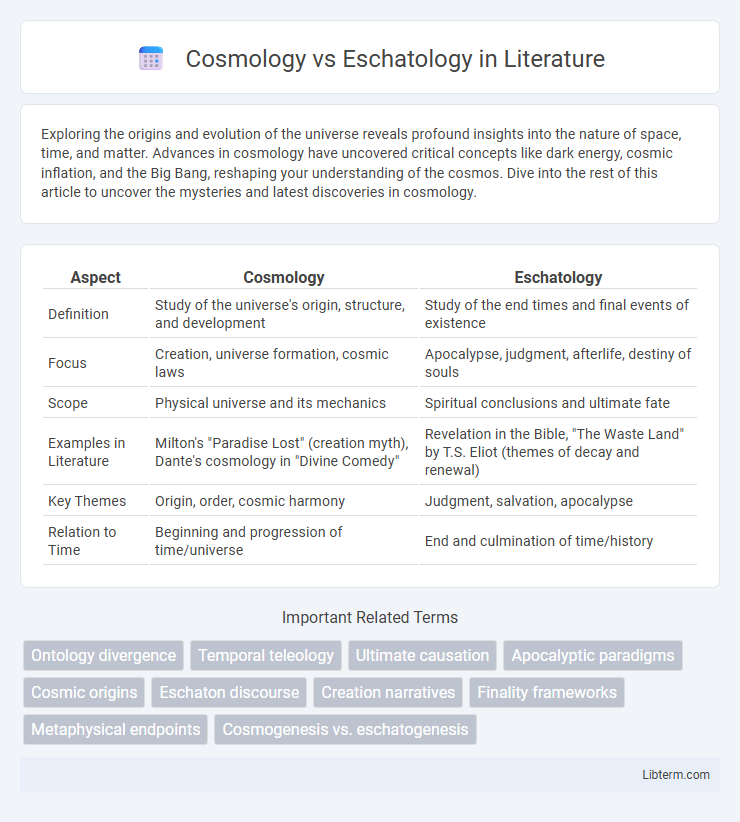Exploring the origins and evolution of the universe reveals profound insights into the nature of space, time, and matter. Advances in cosmology have uncovered critical concepts like dark energy, cosmic inflation, and the Big Bang, reshaping your understanding of the cosmos. Dive into the rest of this article to uncover the mysteries and latest discoveries in cosmology.
Table of Comparison
| Aspect | Cosmology | Eschatology |
|---|---|---|
| Definition | Study of the universe's origin, structure, and development | Study of the end times and final events of existence |
| Focus | Creation, universe formation, cosmic laws | Apocalypse, judgment, afterlife, destiny of souls |
| Scope | Physical universe and its mechanics | Spiritual conclusions and ultimate fate |
| Examples in Literature | Milton's "Paradise Lost" (creation myth), Dante's cosmology in "Divine Comedy" | Revelation in the Bible, "The Waste Land" by T.S. Eliot (themes of decay and renewal) |
| Key Themes | Origin, order, cosmic harmony | Judgment, salvation, apocalypse |
| Relation to Time | Beginning and progression of time/universe | End and culmination of time/history |
Defining Cosmology: The Science of the Universe
Cosmology is the scientific study of the origin, structure, evolution, and eventual fate of the universe, grounded in physics, astronomy, and mathematics. It investigates fundamental concepts such as the Big Bang theory, dark matter, dark energy, and cosmic microwave background radiation to understand the universe's large-scale properties. Unlike eschatology, which deals with final events and end times from theological perspectives, cosmology relies on empirical data and theoretical models to explain the cosmos.
Understanding Eschatology: The Study of Final Things
Eschatology, a branch of theology, examines the ultimate destiny of humanity and the cosmos, including concepts such as the apocalypse, judgment, heaven, and hell. Unlike cosmology, which studies the universe's origin, structure, and physical laws, eschatology explores spiritual and metaphysical themes about the end times and final events. Understanding eschatology involves analyzing religious texts, prophetic visions, and philosophical interpretations centered on final things and ultimate fulfillment.
Historical Roots of Cosmological Thought
Ancient cosmological thought traces back to Mesopotamian, Egyptian, and Greek civilizations, where scholars like Ptolemy and Aristotle laid foundational models of the universe's structure and origins. The historical roots of cosmology emphasize observational and philosophical approaches to understanding celestial bodies and cosmic order. This contrasts with eschatology, which centers on doctrinal beliefs about the universe's ultimate fate and the end of time, rooted primarily in religious traditions.
Eschatological Perspectives in World Religions
Eschatological perspectives in world religions emphasize themes of apocalypse, judgment, and ultimate destiny, often outlining a divine plan for the end times. Christianity highlights the Second Coming of Christ and final judgment, while Islam focuses on the Day of Qiyamah with resurrection and accountability. Hinduism presents cyclical concepts of cosmic dissolution (Pralaya) and rebirth, and Buddhism envisions a decline in Dharma leading to a future Buddha (Maitreya) restoring spiritual balance.
Scientific Theories on the Origins and Fate of the Cosmos
Scientific theories in cosmology explore the origins and large-scale structure of the universe, with the Big Bang theory providing evidence for the universe's expansion from an initial singularity approximately 13.8 billion years ago. Cosmologists study cosmic microwave background radiation, dark matter, and dark energy to understand the universe's composition and predict potential outcomes such as the Big Freeze, Big Crunch, or Big Rip. In contrast, eschatology examines the ultimate fate of the cosmos through philosophical or theological perspectives rather than empirical scientific data.
The Role of Myth and Symbolism in Eschatology
Eschatology employs myth and symbolism to convey complex ideas about the end times, using archetypal imagery such as apocalyptic battles, cosmic renewal, and final judgment to make abstract prophetic concepts accessible and emotionally resonant. These symbolic narratives serve as a means to articulate fears, hopes, and moral lessons about humanity's ultimate destiny, often transcending scientific cosmology's empirical focus on the universe's origin and evolution. Mythological motifs in eschatological texts provide a framework for interpreting existential meaning and framing the spiritual significance of cosmic events beyond the scope of cosmological data.
Crossroads: Where Cosmology Meets Eschatology
Cosmology explores the origins, structure, and evolution of the universe through scientific theories such as the Big Bang and cosmic inflation. Eschatology examines the ultimate fate of the universe and humanity, addressing themes like apocalypse, judgment, and renewal across religious and philosophical traditions. The crossroads where cosmology meets eschatology occur in discussions about the universe's destiny, including concepts like entropy, cosmic expansion, and potential scenarios for cosmic collapse or transformation.
Philosophical Implications of Creation and End Times
Cosmology examines the origins, structure, and evolution of the universe through scientific and philosophical inquiry, highlighting concepts such as the Big Bang, cosmic inflation, and the nature of space-time. Eschatology explores philosophical and theological perspectives on the ultimate destiny and final events of existence, including ideas of apocalypse, divine judgment, and the concept of an afterlife. Both fields intersect in addressing metaphysical questions about creation, purpose, and the fate of the cosmos, shaping human understanding of existence and temporality.
Modern Debates: Science vs. Theology on Ultimate Questions
Modern debates between cosmology and eschatology center on the contrasting approaches science and theology use to address ultimate questions about the universe's origin and fate. Cosmology employs empirical data and physical theories, such as the Big Bang model and cosmic acceleration, to explain the universe's beginning and potential end. Theological eschatology interprets existence through spiritual narratives and prophecies, emphasizing concepts like eternal life and divine judgment, sparking ongoing dialogue about the limits of scientific explanation in understanding ultimate reality.
Future Directions: Integrating Cosmological and Eschatological Insights
Future directions in research emphasize the integration of cosmological models and eschatological theories to enhance understanding of the universe's ultimate fate. Advances in astrophysical data and quantum gravity offer new frameworks to reconcile cosmic evolution with eschatological visions of endings and transformations. Interdisciplinary approaches combining empirical cosmology with theological and philosophical eschatology aim to develop comprehensive narratives about existence and finality.
Cosmology Infographic

 libterm.com
libterm.com